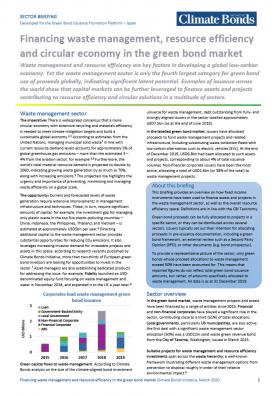Financing Waste Management, Resource Efficiency and Circular Economy is a briefing prepared specifically for the Green Bond Issuance Promotion Platform administered by the Ministry of Environment in Japan (MoEJ). It builds on last year’s publications on Financing Low Carbon Buildings and Green Market Taxonomies, and is designed to provide local and global stakeholders, including issuers and investors, with the latest global analysis and information from Climate Bonds. The briefing covers these themes globally as well as with a particular focus on the Japanese market.
Key findings:
- Waste management projects and assets have been financed in the green bond market since 2015. Allocations to waste management totalled USD6.8bn as at the end of December 2019. Financial and non-financial corporates have pioneered this category with close to a third (61%) of total allocations. Although investments into waste management remain fairly small, the broader emerging trends of resource efficiency and circularity are likely to facilitate future growth.
- Circular economy (CE) is a theme that encompasses not only waste management as a standalone industry sector, but also non-linear use of resources across industries. Green and sustainable bonds have already been used as tools to finance CE solutions by issuers with diverse operations ranging from glass packaging (Owens Illinois, USA) to seafood production (Mowi, Norway) and consumer electronics (Philips, the Netherlands).
- Japan has long roots in fostering resource efficiency through government policy and in practice. The country also exports waste management solutions to parts of the ASEAN region where waste infrastructure is lacking. Further, Japanese companies are embracing a variety of resource efficient CE business models, including remanufacturing, reverse logistics, “as-a-service” models and the sharing economy.
- Japan is well placed to benefit from leveraging its leadership to scale up activity and financing in waste management, resource efficiency and circularity. However, this requires a continued, concerted effort across sectors to create a regulatory framework including clear definitions of what circular economy means and how different actors in the economy can seek financing for assets, projects and activities that qualify under such definitions.
